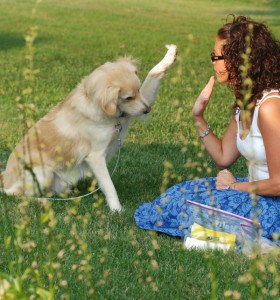Sunday, February 23, 2014
Hi and welcome everyone!
From the desk of Sharda Baker.
This is Sharda with another dog training newsletter!
Here we go!
Choosing a dog is a big decision. There are many different considerations for choosing the best one for you and your family.
When you decide to speak with good dog breeders, either on the phone or in person, have a list in front of you containing all of the questions you want to ask.
It is better to ask too many questions, than not enough.
Questions for the breeder:
- How long have you been breeding puppies?
- What can you tell me about the breed?
- Why are you selling the puppy?
- What health testing has been done for the puppy?
- Has the puppy received his first vaccination?
- Has he been desexed?
- What kind of socialization has the puppy received?
- How did he react to the socialization?
- Does anything seem to frighten the puppy?
- What has the puppy been eating so far?
- How often do you feed him?
- Are the parents registered with any organizations?
- Do you have references of previous customers that I can contact?
- What policies do you have if the puppy turns out to be sick or defected?
- Can I contact you if I have any future questions?
- Is there any specific dog training I shouldn’t do for the dog?
PHYSICAL CHECK
Whether you decide on a puppy from an animal shelter, a pet store, or a breeder, you need to examine him from head to toe. There may be some obvious clues as to the health condition of the puppy.
Look closely into the pup’s eyes to make sure that they are nice and clear. Open his mouth to see that the gums are pink and healthy.
Gently rub his belly and look for protrusions. This would indicate that he might have a hernia. If his tummy is bloated, he may have worms.
Take notice of the puppy’s stance. Do all four legs look properly aligned? Does he walk with a limp or look like he’s in discomfort?
You will also want to check his vision and hearing. How does the puppy respond to your movements? Do his eyes follow you? How does the puppy respond to your voice? Try clapping your hands? How does he react?
So what happens if you find what seems to be the perfect puppy, yet there seems to be minor health concerns? For example, maybe he has ear mites. This happens to be a common ailment that can be treated by a veterinarian.
If the puppy has a health concern that you are just not sure about, request that the puppy be examined by a veterinarian before you buy the puppy.
Many places that sell dogs will allow a veterinary examination within the first one or two weeks of purchase. If a major problem is found, a full refund may be given.
If you are buying from a reputable breeder, he or she has most likely already had the puppy examined with its appropriate shots given. (Another great reason to buy from a puppy from a reputable breeder!) Be sure that you fully understand the return policy before you purchase the puppy.
Of course, within a couple days after you purchase your puppy you should take him to a veterinarian for a thorough check-up.
What if You Made the Wrong Choice?
What happens if you purchase a puppy that you and your family are really excited about, but once you have him home for a while, you realize that it isn’t a good match?
Maybe raising a puppy is more responsibility than you anticipated. Maybe your dog’s temperament isn’t what you expected it to be. Or maybe there is a major change in your life that disables you from giving the dog the attention it needs.
If you realize that you made the wrong choice purchasing a puppy, the best thing you can do is to be proactive in finding him a new home. This should be done right away. The longer you keep the dog with your family, the more difficult it will be for the dog to adjust to another new home.
If you purchased the dog from a breeder, you can call him or her to ask if you could return it. They may or may not take it back. If they do, you shouldn’t expect to get all your money back, although if you do, that is great.
If the breeder will not take back your dog, or if you did not originally purchase the dog from a breeder, contact your local human society for a list of organizations that might be able to help you find an owner.
You can also inquire with individual businesses about placing flyers in their lobbies such as veterinary offices, pet stores, grocery stores, etc. Another option is to place newspaper ads and even ads on web-sites.
In the meantime, it is important for you to make every effort to keep your puppy happy and healthy while you try to find him a new home.
I hope you learned a lot from today’s Dog training newsletter.
I will be back for more!
Warmest regards,
Sharda Baker

